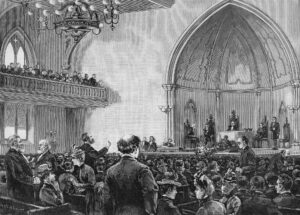In his recent book The Rise and Triumph of the Modern Self, Carl Trueman describes how we have entered into a world in which society understands and generally accepts the notion that a biological male may self-identify as a woman. Even fifty years ago, people generally assumed that a person’s biological makeup defined their sex. The notion that a person could individually express a deep, internal sexual identity regardless of one’s biological makeup was not an available idea within the social imaginary of earlier generations.
Certainly, sexual boundaries had been crossed and precursor ideas existed, but that society would understand—simply even to have the intellectual framework to understand—what it means for someone to say that they are a woman trapped within a man’s body is new.
Trueman’s work The Rise and Triumph of the Modern Self then explains how this came about. While necessarily selective, he begins with Jean-Jacques Rousseau and recounts the development of the modern self up until the modern with contemporary thinkers and popular proponents of expressive individualism.

The Rise and Triumph of the Modern Self: Cultural Amnesia, Expressive Individualism, and the Road to Sexual Revolution
Carl Trueman
The Rise and Triumph of the Modern Self: Cultural Amnesia, Expressive Individualism, and the Road to Sexual Revolution
Carl Trueman
Everyone who can should read The Rise and Triumph of the Modern Self. Read it to understand the world in which we live, to understand why the sexual revolution has made such inroads and likely will continue to do so, and how to think through how to respond as both a human being and Christian to these rapid and dramatic changes to the world.
To overly simplify the narrative (but hopefully to give readers some hooks to hang their understanding upon), Trueman sees the movement from then to now as working out like this. First, Rousseau defines the human person as naturally good but despoiled by outward influences. Next, the Romantics pointed to our inward sentiments as the true good, agreeing with Rousseau that society generally prevented the sentimental goods within. Nietzche, Darwin, and Marx in various ways discounted stable human natures and allowed the idea of a plastic human nature to take hold.
From here, it will become easier to understand why sexuality, identity, and self-expression play such an important role in later thinkers. Freud said that the self is sexual. Others agreed or at least saw his intuition as helpful. If human nature is plastic, then why assume it is stable. Perhaps that stability is merely the mores of society preventing someone from expressing their truest sentiments. Here I am probably going beyond Trueman’s exact argument, but he definitely draws historical lines between the thinkers mentioned above and our current cultural moment with emotivism and expressive individualism.
Let me define these terms. Alisdair MacIntyre speaks of emotivism as a sort of moral reasoning. How we feel is what is right. Charles Taylor talks about expressive individualism to describe how individuals feel most authentic when they express how they feel—their inner sentiments. If you have ever heard the phrase “you do you” or “you gotta do what makes you feel happy” or “find a man/woman who makes you happy,” then you know what emotivism and expressive individualism mean.
These ways of being-in-the-world form part of our social imaginary—a phrase that describes all the assumptions that a society has even if not explicitly stated. It is what makes plausible the idea that a biological male may plausibly identify as a woman. The man feels that his inner-person truly and authentically is female—and this identity matters and is true. You do you as long as it does not harm anyone else.
The older idea of tolerance then no longer matters. If I tolerate someone whose most authentic self reflects a queer or trans identity, then to merely tolerate is seen to psychologically harm someone whose identity is both public and intensely personal. To tolerate without approval is, from the perspective of many today, hateful and harmful. This explains why a gay couple are not satisfied with a Christian baker who merely tolerates them; the baker must bake the cake or else do psychological harm.
As Trueman notes, recent legal rulings in the USA have begun using the language of the psychological self, rooted in Rousseau and expressed now across popular media from Ariana Grande to Instagram. The intellectual elite have had their ideas dispersed through art, especially surrealism and pop music. It has become part of the social imaginary. It is the world in which we inhabit.
Trueman describes this movement from then to now in limited ways to provide a prolegomenon (an introduction and preparation) to help readers understand and respond to the challenges that the modern self brings. Perhaps the biggest challenge is that we are all by definition part of this new world of the self. Trueman writes, “When it comes to how we think of ourselves, we are all expressive individualists now, and there is no way we can escape from this fact. It is the essence of the world in which we have to live and of which we are a part” (386).
Given that we are a part of this world, everyone who can should read The Rise and Triumph of the Modern Self. Read it to understand the world in which we live, to understand why the sexual revolution has made such inroads and likely will continue to do so, and how to think through how to respond as both a human being and Christian to these rapid and dramatic changes to the world.
Crossway provided a review copy






















